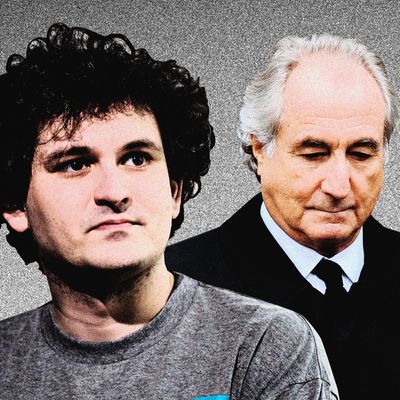
On December 11, 2008, Bernie Madoff was arrested and criminally charged with one of the biggest financial frauds in history — an audacious, long-running Ponzi scheme that resulted in tens of billions of dollars in lost investor funds. At the time, the scandal sparked a national conversation about the gross deficiencies of our country’s white-collar enforcement regime, but ever since the initial revelations about the problems at FTX and about Sam Bankman-Fried’s criminal exposure, the Madoff case has resurfaced as a point of comparison for Bankman-Fried’s alleged misdeeds — and as a rallying cry for people who believe he should already have been locked up by U.S. prosecutors.
Bankman-Fried was asked about the comparison by Good Morning America anchor George Stephanopoulos and (of course) rejected it, arguing that FTX was a “real business” in contrast to Madoff’s outright Ponzi scheme.
But how much weight does the comparison deserve — particularly as a guide to how prosecutors ought to be handling the case? Unfortunately for those seeking immediate action by the Department of Justice, while the juxtaposition — between the swiftness of Madoff’s arrest and the fact that SBF is apparently enjoying life in the Bahamas — is superficially compelling, it does not withstand more than a few minutes’ worth of scrutiny. In fact, these claims run the serious risk of misleading the many people, including victims, who are understandably angry about what may have been a gigantic fraud. Those who are eager to see Bankman-Fried charged with serious financial crimes will just have to be patient.
Let’s start with the actual circumstances of Madoff’s arrest. The scheme was not detected by the government or the media — infamously — but was in fact revealed by Madoff himself, who confessed the whole thing to his sons once he realized that he could not keep up the fraud. According to the criminal complaint filed on the day of his arrest, Madoff told his sons “that he was ‘finished,’ that he had ‘absolutely nothing,’ that ‘it’s all just one big lie,’ and that it was ‘basically a giant Ponzi scheme.’” His sons called the FBI, and two days later, two agents showed up at his home and asked whether “there’s an innocent explanation” for what Madoff had told his sons. Madoff literally replied, “There is no innocent explanation.”
At the risk of stating the obvious, the reason Madoff was arrested so quickly is because he confessed to every element of criminal fraud — including both the underlying scheme and his criminal intent. This meant that the FBI had both that confession and highly potent, admissible evidence of guilt in the form of testimony from his adult children (who had no apparent axe to grind).
If that is all the government ever had, they would have been able to convict Madoff easily at trial. (He eventually pled guilty.) They also needed to make sure that Madoff did not have second thoughts — he told his sons that he planned to turn himself in to authorities in about a week — and that he would not attempt to flee the country instead.
We have not seen anything like a real admission of criminal conduct from SBF yet and, of course, he is not in the country at the moment, so there is no imperative (no ability, really) to keep him in the United States. As important, SBF has been rather talkative in interviews — including in an interview with New York’s Jen Wieczner that was published yesterday — but he has been careful as well. So far as I can tell, he has held firm on a central point for his defense — that the epic, still-unspooling fiasco at FTX was the result of sloppiness and inadvertent missteps by the company’s leadership rather than an intentional effort to mislead FTX customers or investors.
This means that the Justice Department will need to try to get to the bottom of it by conducting an investigation that could take a long time, which is not to say that it will take SBF’s claims at face value. In fact, I am sure it will not, since his comments on the most prominent issue at the moment — FTX’s transfer of customer funds to SBF’s hedge fund, Alameda Research, and the subsequent loss of more than $1 billion — have been transparently evasive and substantively meaningless. (We have seen this before, down to eerily familiar media minutiae: In 2016, just days after The Wall Street Journal published its first exposé about Theranos, Elizabeth Holmes took the stage for an interview at a conference organized by the paper in which she insisted that the whole thing was a huge misunderstanding.)
What does an investigation of an international financial fraud like this look like? To simplify matters greatly, the government is going to be looking for three things — documents, witnesses, and data — to determine whether SBF or those around him committed fraud. Let’s take these in turn.
It is not yet clear how easy it will be for the government to obtain internal emails from FTX and personal communications among SBF and his lieutenants. It will depend in significant part on whether and to what extent FTX, SBF, et al. were using U.S.-based technology providers like Google or Microsoft who (a) still have this material and (b) can and will comply with U.S. legal process. (Anything that has been permanently deleted or that was communicated over an encrypted messaging app like Signal will be difficult if not impossible to recover as a practical matter.) Even in the relatively straightforward situation in which the government can obtain emails from a third party like Microsoft, this still requires the government to undertake a potentially lengthy process — to prepare an application for a search warrant that establishes probable cause as to each of the email accounts whose contents investigators are seeking; to wait for the company to comply, which can take months under ordinary circumstances; and to actually review the material itself.
There are some ways around this, though whether and to what extent the Justice Department will be able to avail itself of them is unclear at the moment. The government could try to subpoena one of FTX’s U.S.-based entities for the documents, or FTX’s new lawyers could voluntarily produce material to prosecutors, but neither of these paths is as straightforward as they sound if the documents actually reside on a server outside the U.S., and both rely on FTX (or its service providers) having retained the underlying material in the first place. It is also possible that the Bahamian authorities might have their own legal tools to obtain documents and that they would be willing to share them with U.S. prosecutors, but that is also far from clear at the moment.
Of course, documents are a foundational part of any financial-fraud case, but at the end of the day, if criminal charges are actually brought, witnesses have to take the stand to explain to a jury what happened. That means that prosecutors have to identify knowledgeable people who can and will cooperate, but so far, I have yet to see anyone who worked at FTX provide a compelling firsthand account of criminal conduct perpetrated by SBF or anyone else. That does not mean nothing nefarious happened — just that the government may need to piece things together using accounts from different people who themselves may not have had full visibility into FTX and Alameda’s operations.
The Justice Department will have to try to interview people who worked at FTX and Alameda, which is par for the course in a financial-fraud case, but that is much harder when witnesses are overseas. For one thing, the government cannot simply subpoena witnesses the way it can with people who are in the country, and witnesses in foreign countries can easily decline voluntary interviews. The government also has much less leverage over witnesses abroad who have criminal exposure, since the risk of an indictment is not as potent when you might plausibly never see the inside of a U.S. courtroom even assuming that you are charged at some point.
As for “data,” that is a very large bucket that could include both customer-level account and transaction data as well as the company’s enterprise-level books and records, assuming that these things even exist and are reliable — two very big unknowns. When I prosecuted international financial fraud at the Justice Department, I placed a significant premium on the swiftness of criminal accountability even if the underlying flow of funds could not be forensically retraced, but this was not a universally held view among my colleagues.
Some prosecutors believe that juries expect a comprehensive accounting of what actually happened to all of the money in a complex fraud scheme, but in this day and age, that is getting harder for prosecutors to provide, particularly when foreign bank accounts are involved. The Justice Department can request foreign banking data from other countries, but depending on the jurisdiction, it can take literal years to get a response, and even then, the information may be incomplete or simply lead the government to more foreign bank accounts, which, in turn, require further requests and investigation.
The FTX bankruptcy proceeding is going to complicate matters further. As is sadly common for these situations, the company is now spending what little money it still has on expensive lawyers and bankruptcy professionals, including a team from Sullivan & Cromwell who will do what I gather is an internal investigation on behalf of the company’s new leadership. The government is going to need to figure out its posture toward that investigation, which is not going to be easy.
I certainly understand why people would bristle at all of these sources of potential delay, but this sort of investigative slog is much more common in a white-collar case than a quick arrest. For instance, it took almost a year for the U.S. Attorney’s office in Manhattan (which is reportedly handling the FTX investigation) to charge the founder of the electric-truck start-up Nikola with fraud even though the short-selling firm Hindenburg Research seemingly did all of the work when it published a lengthy report that precipitated the investigation in the first place. And it took nearly two years for the department to charge Holmes even after the Journal’s John Carreyrou publicly exposed the central problems at Theranos.
Prosecutors at the Justice Department cannot — and do not — simply indict people based on what they read in the press, no matter how damning it may seem. Even if they desperately want to charge someone, prosecutors have to conduct their own investigation to develop robust, admissible evidence of criminal misconduct, which requires gathering and reviewing documents and data, speaking with witnesses, and — perhaps above all — time.






























